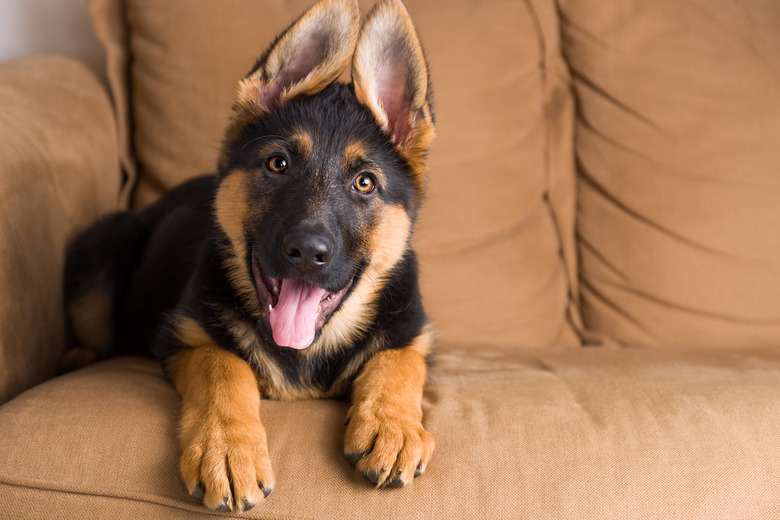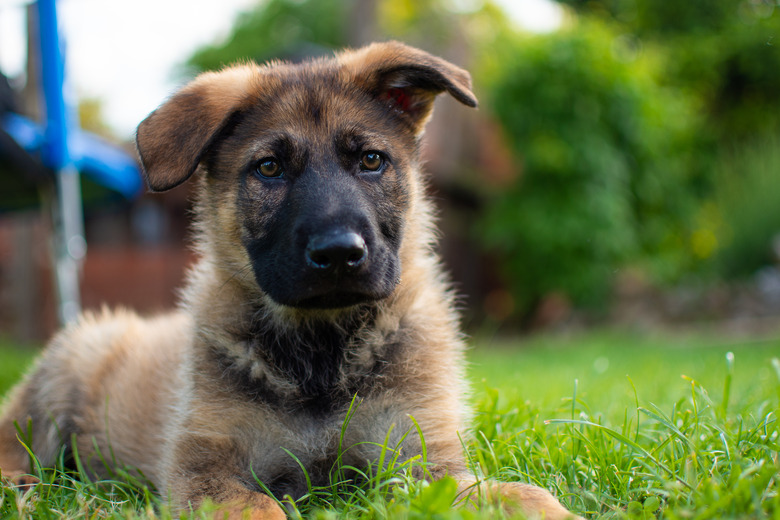When Do German Shepherds Lose Their Baby Teeth?
As a new shepherd puppy owner, you may be asking yourself, "At what age do German shepherd puppies stop biting?" Indeed, pet parents look forward to the day when the last of those razor-sharp German shepherd teeth drops out, and they can safely tussle with their pet during playtime.
German shepherd owners should note, however, that as a large, muscular breed, this protective yet playful dog type has a solid frame and a mouth to match, which means that accidental nips during playtime aren't uncommon. If your puppy is teething, he may attempt to chew on any and all items in his path, from baseboards and winter hats to your brand-new iPhone.
German shepherd teeth
German shepherd teeth
The first set of teeth that your pet will sport are called primary, or deciduous, teeth, which are so pointy and sharp that they're sometimes referred to as needle teeth. These itty-bitty puppy teeth start to emerge around 3 weeks of age, and by 6 weeks, all of her primary teeth will be in. When your pup is 3 or 4 months old (though this will vary a bit by breed), his mouth of 28 puppy teeth will start to be replaced with 42 adult chompers. At 6 months, the last of the deciduous teeth will have fallen away, and your pup's permanent, adult mouth will be complete.
Losing puppy teeth
Losing puppy teeth
As your German shepherd's teeth start to drop out, you might find one or two around the house, but it's more likely that your pet will simply swallow these tiny teeth at mealtime or when he's chewing on a toy. A teething puppy may eat less than usual and chew on toys and other objects to satisfying the pain and discomfort that tends to accompany the cutting of new teeth. You might even notice a bit of blood in your dog's mouth or on his chew toys.
Easing puppy teething
Easing puppy teething
The eruption of new teeth can really hurt, and to lessen the pain, your puppy will search for things on which he can chew. To prevent the destruction of your personal property and to teach your little guy what's OK to gnaw and what isn't, be sure to provide appropriate toys for your dog's size and breed.
Textured ropes, durable rubber, or softer, squeaky playthings can help with teething pain and entertain your dog at the same time. To soothe German shepherd teeth and that aching mouth, you might try freezing a rubber toy, as the icy cold can soothe the gums.
Start oral care early
Start oral care early
A clean mouth is a healthy mouth, and the numbers bear this out. More than two-thirds of dogs over 3 years of age have periodontal disease, which is an infection of the tissue around the teeth. Even though your puppy will shed his baby teeth, it's still important to start caring for your dog's teeth as early as possible so your pet gets used to the process. Strive to clean your pup's teeth three times a week, though twice a day is ideal.
Find a quiet spot to brush and use your finger or a soft cloth to rub gently along your dog's teeth. Once she's OK with this step, let her taste the canine paste you plan to use and then smear a bit on the cloth and rub it onto her teeth. Don't be tempted to use human toothpaste, however, as it shouldn't be swallowed and may contain ingredients that are toxic to dogs. The last step is to add the brush with a dab of doggie paste and slowly raise your dog's lips on one side of her mouth. Focus your cleaning on the outer teeth surfaces, as this is where most plaque buildup occurs.

